The Family is a strategic, minority, long-term shareholder. We grow a portfolio of investments in scalable companies, ideally from an early stage so as to create a privileged relationship with their founders. We identify the best of the best, finding Entrepreneurs through a process based on content and education. We then work with founders, providing them with resources (education, unfair advantages, and capital) and maximizing their chance of large-scale success. In other words, we operate our own proprietary ecosystem, designed to defeat toxic startup environments and to build scalable businesses.
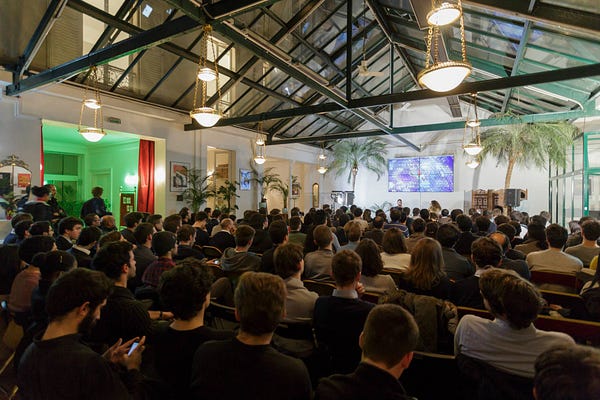
‘Ecosystem’:
the problem is that the very term has become a bit of a cliché.
Everyone uses it. For most people, its meaning has been lost along the
way. It has become irritating to hear everyone talking about the damned
‘ecosystem’, all the more so because in reality it’s often not an
ecosystem but a toxic environment for startups. And yet, if we follow Wikipedia, it seems that ‘ecosystem’ is a relevant word when it comes to describing the entrepreneurial environment. An ecosystem is
“A community of living organisms in conjunction with the nonliving components of their environment (things like air, water and mineral soil), interacting as a system.”
In
short, an ecosystem designates entities living together in a habitat.
It should be clear that those entities live better, longer, and happier
lives if that habitat is healthy!

Most
discussions regarding the best habitat for Entrepreneurs focus on
Silicon Valley. An abundant, mostly American, literature is dedicated to
analyzing Silicon Valley’s success on the entrepreneurial front. Some explain why everything is so good in the Valley
today, but don’t reveal how it all came together. Others go back to a
distant past, but jump to premature conclusions: everything happened
because of (you choose) Defense contracts / a mild climate in the Bay
Area / Stanford University / technology clusters / the culture of rewarding failure / favorable tax and legal conditions. Finally, many sources help understand the critical role played by certain individuals: Frederick Terman, Georges Doriot (even though he was on the East Coast), Robert Noyce, Andy Grove, or Steve Jobs.
It is worth noting, however, that most authors on the subject
rightfully conclude that history never repeats itself and therefore that
it’s not possible to emulate Silicon Valley’s story.
It’s
high time we went beyond simplistic analyses. There’s not much time
left: Silicon Valley is pulling way ahead and windows of opportunities
are closing fast for other territories. But at the same time, there is a
better understanding of how to grow a healthy entrepreneurial habitat: Steve Blank, Vivek Wadhwa (who recently joined TheFamily’s board), Paul Graham and Brad Feld are all getting a feel for what led to Silicon Valley’s dominance. Based on this understanding, it’s TheFamily’s mission
to protect ambitious Entrepreneurs against toxic environments and to
deploy our own proprietary ecosystem that maximizes their probability of
success. For that reason, we constantly work on understanding what
makes a great ecosystem and how it can be improved for the Entrepreneurs
who inhabit it. We’ve read a lot, met hundreds of people, and worked on
a model to make it easier to share our views on that matter.
Three ingredients
Our
model is relatively simple, based on the idea that the entrepreneurial
ecosystem has three characteristic ingredients. They are as follows:
- capital—by definition, no new business can be launched without money and relevant infrastructures (which consist of capital tied up in tangible assets);
- know-how—you need engineers, developers, designers, salespeople: all those whose skills are necessary for launching and growing innovative businesses;
- rebellion—an entrepreneur always challenges the status quo. If they wanted to play by the book, they would innovate within big, established companies, where they would be better paid and would have access to more resources.
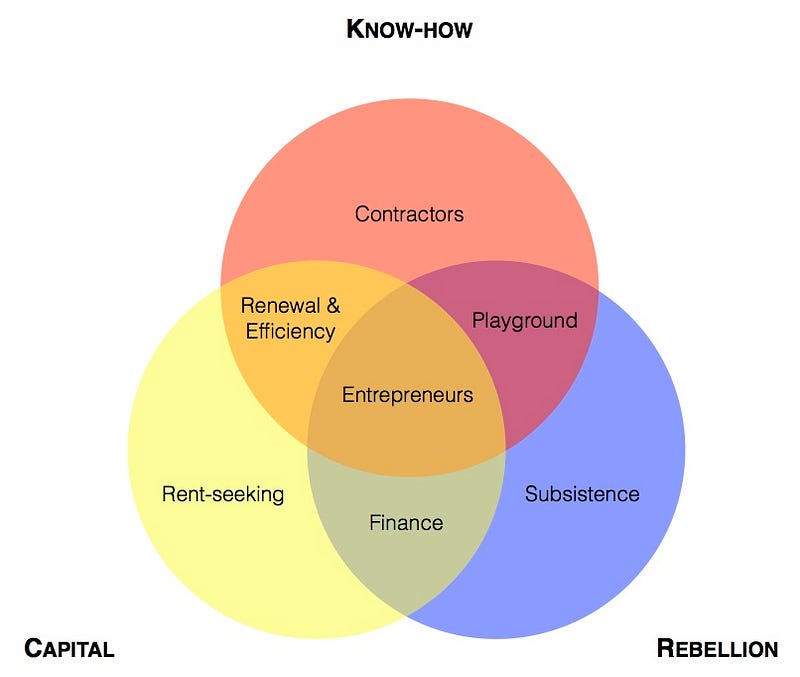
All
three ingredients are present, in variable proportions, in every
country. But the most important thing is not simply their relative
presence or absence in a certain place. Rather, it’s the degree to which
they mix within the entrepreneurial part of the economy. That is to
say, is there a place where all three ingredients come together, where
capitalists, engineers, and rebels get to know one another and do great
work together?
Seven combinations
The
way the three ingredients are combined tells a great deal about a given
country’s specific economy and sociology. There are seven possible
combinations.

Capital only = rent-seeking economy.
Oil-rich countries, such as those in the Persian Gulf, or those who own
an essential, sought-after infrastructure (such as the Panama Canal or
the pyramids in Egypt) are a good example of rent-seeking economies.
Those are often dominated by real estate, natural resources, and
utilities. In such economies, know-how is not rewarded (if it exists at
all) and rebellion is repressed, sometimes through violence.
Rent-seeking may also involve lots of lawyers: lobbying the government and suing innovative Entrepreneurs are simply two ways of seeking rent in democratic countries.
Capital + know-how = efficiency economy.
When capital meets know-how in the absence of rebellion, innovation
tends to be concentrated in established companies, which have only two
goals: renew their products and improve the efficiency of their
operations. As noted by Clayton Christensen,
these kinds of innovation destroy jobs and free up capital (rather than
empowering innovation which ties up capital and creates lots of jobs).
Freed capital is then invested elsewhere, often sustaining the
rent-seeking part of the economy. Above all, as noted by William Janeway,
efficiency is the enemy of innovation: you can’t expect radical,
Silicon Valley-style innovation from an economy without rebellion.

Know-how only = contractor economy.
It’s quite simple: if there are lots of engineers, but no capital to
invest and no taste for rebellion, then the best way to create value is
to sell the engineers' know-how to foreign companies. This is what India does:
selling IT engineering work to clients in developed countries. The
contractor economy is characterized by narrow margins (revealed by cost-plus, non-scalable business models), thus it doesn’t contribute much to economic development.
Know-how + rebellion = playground economy.
Why a playground? Because in such an economy, people may look like
Entrepreneurs when in fact they’re more like children without the right
(or the means) to grow. I have a specific example in mind. Every year or
so, I go back to my old engineering school in Brittany.
Every time I’m there, people tell me about lots of projects, whether in
research, business, or both. But once I leave, none of those projects
is ever heard from again. The following year, when I’m back on campus,
they’ve left no trace. Ideas and small-scale experiments simply fall
away into the ether. Why? Because when the economy lacks capital, local
rebels are unable to go from fleshing out an idea to building an empire.
The playground economy is a bit as if Larry Page and Sergey Brin had
invented PageRank, published their famous article,
tested the algorithm on the Stanford campus, then moved on to business
as usual because the banker refused them the loan they needed to start a
company. The playground economy exists where research is entrapped in
the academic world, or startups are prevented from growing due to
hostile regulations and a lack of capital. Playground innovation is
mostly funded by the government, through research grants or SMB subsidies. It creates few jobs (except for those managing government subsidies) and doesn’t create value at a larger scale.

Rebellion only = subsistence economy.
When there’s neither capital nor know-how to start and grow companies,
rebellion finds other ways: political movements, social activism,
artistic creation, and crime. Marginal artists in Berlin, punks in
England, and social activists in Porto Alegre are primary examples of
what dominates a subsistence economy. It gives birth to great art, it
drives social and political changes, it certainly stirs up anger, but it
doesn’t help build great business empires. An economy fueled only by
rebellion resembles many of the least developed countries: know-how is
scarce due to the failure of the higher-education system or massive
talent emigration; capital is spirited away by a fearful elite. Those
who stay are the people in need who just try to make ends meet;
charitable NGOs try to help them out; merchants make a business out of
scarcity and extract the residual value out of a failed economy. Indeed,
the only ones who create value in such economies are usually
rent-seeking merchants and illegal organizations. As a result, there may
be lots of capital, but since it’s been extracted
by predators such as traffickers or monopolist traders, it can’t be
invested into entrepreneurial ventures. As for genuine creators, they
fall into two categories: artists and activists. The former find success
abroad and are the local heroes; the latter ultimately trigger
revolutions. It should be noticed that subsistence economies are not
confined to developing nations: in every high income country, there are
areas where there is nothing but rebellion. I’m sure you can picture
them.
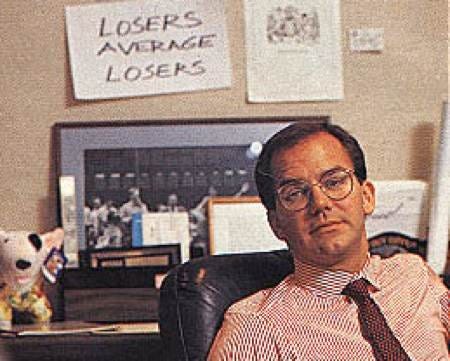
Rebellion + capital = financial economy.
Contrary to what people usually expect, finance is one of the most
rebellious sectors out there. Decades of deregulation of financial
markets have revealed how powerful finance is when it comes to forcing
change upon companies or even whole societies. Without the know-how to
start and grow a company, you can still make your mark (and earn a
bundle) by exerting your sense of rebellion in the financial sector. In
fact, many financiers are all the more rebellious as they come from
humble backgrounds and desperately want to escape their direct,
traumatic experience of the subsistence economy. A financial economy
captures a great deal of value and creates a great deal of wealth. But
the essence of the financial business does not lead to inclusive
institutions: as it is concentrated in the hands of the few, it makes it
complicated to ignite widespread economic development. A few rich
traders won’t make a flourishing economy!

Capital + know-how + rebellion = entrepreneurial economy.
The Valley is the most obvious example. Capital initially came from the
Department of Defense, then from early venture capital funds, and now
from more traditional investors such as Goldman Sachs.
Know-how was present from the late 1940s on, thanks to the attraction
of engineers in the field of microwaves, then semiconductors. Finally,
rebellion is a mindset that is typical in California. Many rebels have gathered there, from the first motorcycle clubs to artists, hippies, student leaders, LSD advocates, gay activists, Ronald Reagan, and of course computer scientists. The Valley is the byproduct of those three ingredients mixing together.
A
quick step back, though. Is an entrepreneurial economy preferable? Is
creating a healthy habitat for Entrepreneurs really that important?
Aren’t we better off seeking rent or supporting the efficiency
innovation efforts of established companies? These are tricky questions,
but for us at TheFamily, the answers to them are clear: yes, yes, and
no, we’re not!

In an economy in transition,
an entrepreneurial economy creates far more value, more widely
distributed, than any other economy: in Silicon Valley, you’ll find the
headquarters of giant tech companies, ultra-rich Entrepreneurs,
thousands of highly-paid engineers, designers, and managers, an adjacent
economy that provides local services and amenities and creates lots of
jobs for the less educated, and massive tax revenues to finance better
public services. Silicon Valley is probably the closest to what Edmund
Phelps (Nobel Prize in Economics) calls “mass flourishing”:
Flourishing is the successful exercise of creativity and talents. To flourish, people have to engage a world of challenges and opportunities. The economy’s dynamism and the resulting experience of business life are central to our well-being.

Yet Silicon Valley has its weaknesses as well, demonstrated by the tension in its real estate market and, like elsewhere in the U.S., its limited social safety net.
These features should not be discounted as we look around at other
geographic areas and other economies where entrepreneurship can thrive.
The entropy in the system
It
is interesting to think about how a territory can drift from one
economy to another. There’s actually a lot of entropy in the system:
without successful Entrepreneurs, any entrepreneurial economy tends to
decline into something else. After all, Paris used to be a fantastically
entrepreneurial place at the dawn of the twentieth century. Hence the importance of immigration
in sustaining an entrepreneurial ecosystem: once entrepreneurial
institutions have been built by the first generation, it is vital that
Entrepreneurs from outside flow in to sustain the ecosystem and help it
grow.
Even
when you only have two ingredients out of three, entropy is still at
work and one of the two tends to be eradicated in time. Consider the
three scenarios below.

A playground economy (know-how + rebellion) turning into a subsistence economy (rebellion only).
If the know-how disappears, the playground is destroyed and there’s
only rebellion left. That’s what happened when Soviet Russia (which was
in itself a type of giant playground: lots of high technology, but no
business empires whatsoever) transitioned to capitalist Russia, as most
of the country’s know-how took off for Israel or the United States. From
that point on, money was to be made only from natural resources (hence a
rent-seeking economy dominated by oligarchs) until the prices went down
(to a subsistence economy without much hope for anyone).
A playground economy (know-how + rebellion) turning into a contractor economy (know-how only).
Even if they don’t leave the country, ultimately engineers get fed up
with failed projects trapped in the playgrounds. For them, it takes only
one step to become contractors. This is precisely the reason why every
French startup aims at becoming the next Google and ends up becoming a
small IT service business or Web agency. It’s OK, it pays the bills, but
margins are thin and it doesn’t scale—at
all. These startups-turned-Web-agencies don’t add up to an
entrepreneurial economy, they contribute to developing a contractor
economy with very little innovation.
A financial economy (capital + rebellion) turning into a subsistence economy (rebellion only).
Watch out when capital flees from a country without know-how: Greece is
a case in point. I suppose the United Kingdom also saw it coming in
2008. That is probably the reason why they decided to get serious about
growing an entrepreneurial ecosystem in the wake of the crisis.

It
isn’t enough to have two or even all of the key ingredients in one
place. They tend to not mix together too easily. Even worse, in many
cases they tend to evict one another, thus breaking the dynamics that
could make a non-entrepreneurial economy more entrepreneurial. We all
understand that it is much easier to seek rent, become a contractor or
stay in the playground. You have to work hard to counter that trend and
force the ingredients to mix together.
For
instance, you can try to turn a rent-seeking economy (capital only)
into a financial economy (capital + rebellion). Dubai or Abu Dhabi are
attempting to do just that, because when the oil reserves dry out,
rent-seeking will take a huge blow. Opening a Sorbonne subsidiary or
using the Louvre brand is probably their attempt to inspire some
rebellion and pave the way to the United Emirates becoming an
entrepreneurial place in a distant future. We’ll see.
The key role of Entrepreneurs
So
in order to counter that entropy, to mix all three ingredients and tie
them together in the long term, it takes, well, an entrepreneurial
ecosystem. And the only ones able to build it are—you guessed right—the
Entrepreneurs themselves, those whom Babak Nivi defines as having “the ability to serve a customer at the highest level of quality and scale, simultaneously”.
They initiate the best practices, overcome the obstacles and finally
build the institutions that become the pillars of an entrepreneurial
economy.
Consider the three cases that follow.

A playground economy turning into an entrepreneurial economy. It happened in Israel. The book Startup Nation
tells us about those Israeli aspiring Entrepreneurs who, in the 1980s,
built superb products but failed to market them to would-be customers.
They weren’t short in know-how (even less so after the collapse of the
Soviet Union, which brought many top-notch scientists to Israel), nor
were they short in rebellion (what with the famous chutzpah and all). But there was no capital: Israel was a playground economy at that time. Then, working with the Entrepreneurs, the Israeli government designed the Yozma
program to attract American venture capital and turn Israel into an
entrepreneurial ecosystem. Everything changed from that point on.

A financial economy turning into an entrepreneurial economy.
Here, we have London. The British government has a very simple
reasoning: if London is the European capital of the financial sector,
then it should become the European capital of innovation and technology
in the financial sector. The first « FinTech » Entrepreneurs benefited
from favorable conditions in the City (an economy already specialized in
finance and with a great deal of capital), then attracted talent from all over the European Union,
thanks to a very welcoming immigration policy towards citizens of other
member states. London already had quite a high level of capital and
rebellion (after all, England is home to the punk movement). The first
Entrepreneurs, supported by the government, did what had to be done to
overcome the deficit in know-how.

An efficiency economy turning into an entrepreneurial economy. This happened at the dawn of the Silicon Valley. Did you know that Fairchild Semiconductor,
the company that became both the matrix of the modern Silicon Valley
and an inspiring precedent for all its Entrepreneurs, was a subsidiary
of an established East Coast company called Fairchild Camera and
Instrument? At one point, Robert Noyce and Gordon Moore couldn’t stand
the constraints imposed by their corporate parent (which clearly favored
efficiency above entrepreneurship) and decided to leave and start
Intel. Their own personal touch of rebellion was enough to transform the
local ecosystem and give birth to the fastest-growing entrepreneurial
economy in the world.
In
each case, a virtuous circle was initiated. In Israel, the combination
of know-how and rebellion attracted foreign capital, with a little help
from the government. In London, capital itself helped buy know-how
thanks to the freedom of circulation in the European Union. What is
probably more difficult to ignite is rebellion, which really depends on
courageous, pioneering individuals who bear all the risks where
entrepreneurial institutions are still lacking.
The
idea that it takes Entrepreneurs to create an entrepreneurial ecosystem
sounds like a tautology. Yet we must continue to hammer on this point.
Many initiatives to create an entrepreneurial economy in the past came
from the government or big established corporations. As Josh Lerner proved in a remarkable book,
every one of those initiatives fell through (I insist: systematically,
in every case, without exception, at a 100% rate, this led to a
failure). In none of these cases did the government or established
companies manage to create an entrepreneurial economy by using a
methodical and planned approach. (In France, Sophia-Antipolis
is a case in point, as are all the later efforts to artificially create
such clusters.) This is the reason why you have to rely on the
Entrepreneurs and stimulate their ambition at the highest level
possible.

There’s an empirical law here, one that Brad Feld formalized in his 'Boulder Thesis' and one that also inspired us to start TheFamily: only Entrepreneurs
who combine long-term vision with short-term flexibility can inspire
and grow an entrepreneurial economy. If you have the ingredients, let
the Entrepreneurs cook them! That is precisely when heterogeneous
elements can mash themselves into a system, built by Entrepreneurs for
Entrepreneurs.
It
should be noted that an entrepreneurial economy takes off more easily
where other parts of the economy are not so strong. It’s difficult to be
contrarian where a certain type of value creation is at its strongest.
You can’t beat the financial economy in New York, but you can beat it in
California, with government contracts covering the build-up. Even Michael Milken had to be in California
to invent and implement high-yield bonds! London may be an exception
here—providing radical financial innovation at the heart of the
financial sector in Europe— but the success of the London FinTech sector
has yet to be proven and what’s more, ensuring it takes the active
support of the government because finance is a highly regulated sector
(yes, it is).

Also,
make no mistake: everybody likes to be called an Entrepreneur, because
there’s now a lot of prestige that comes with the title. But you’re no
Entrepreneur if you lack ambition, abide by the status quo, or don’t
want to build an empire. So it’s not enough to have people who call
themselves ‘Entrepreneurs’. Docile engineers, however competent, make
bad hackers. Complacent capitalists prefer to seek rent rather than to finance risky new ventures. What you need are those whom Marc Andreessen calls “imperial, will-to-power people who want to crush their competition.”
Walter
White, the ultimate rebel, summed it up for us: he’s not in the meth
business (= know-how), nor in the money business (= capital), but in the
empire business (= all of the above + rebellion).
Benchmarking different countries
Another
interesting perspective is found by looking at various countries and
trying to understand why some perform better than others when it comes
to growing a healthy entrepreneurial ecosystem.
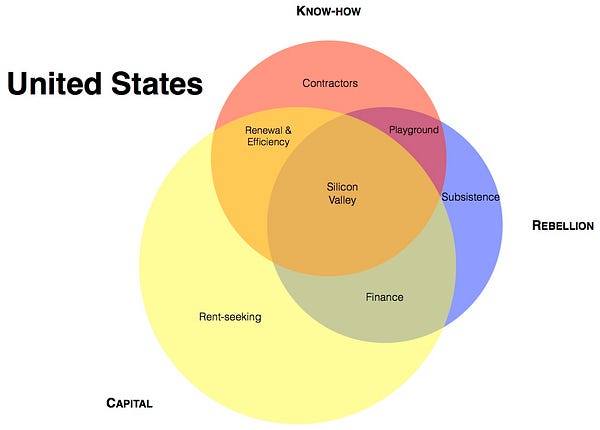
Let us begin with the United States. The ingredients are there: fantastic amounts of capital + lots of know-how + a great potential for rebellion (at least since 1776). The rent-seeking economy is obviously a huge part of the American economy, with oil, real estate, and utilities:
wherever there is a lot of capital, people tend to seek rent.
Fortunately, know-how is there as a counterbalance and is heavily
represented within the entrepreneurial economy, especially in Silicon
Valley. The financial economy is also huge (New York, Dallas, Chicago),
but is receding as compared to Silicon Valley, which is attracting
capital and even becoming a political power in the American democracy.
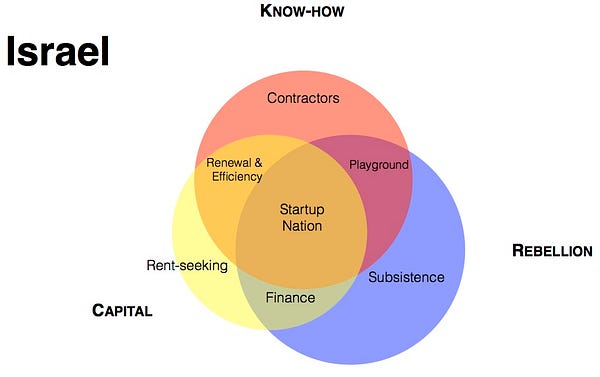
Israel
is a very interesting case, as it used to have a serious gap: capital.
The Yozma program helped launch a very dynamic local venture capital
ecosystem, even though traditional small businesses still had
difficulties accessing capital in the Israeli banking system. Hence in
the Israeli economy, available capital has been primarily invested in
entrepreneurial ventures, not traditional businesses. As a result, the
Israeli entrepreneurial economy now attracts most of the know-how and
diminishes the contractor part of the economy: contrary to their Indian
(or French) counterparts, Israeli engineers work for Israeli startups
(and the American tech companies that buy them) instead of working as contractors for foreign clients.
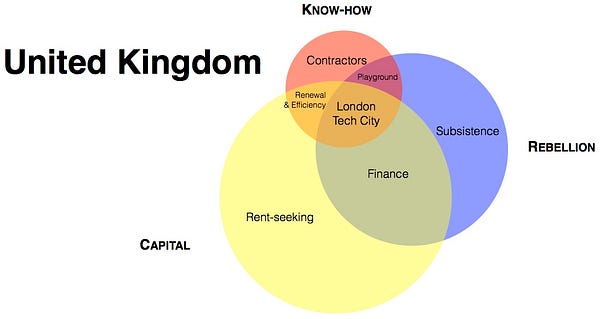
The United Kingdom
is another very interesting example. In short, the British economy
accounts for an enormous amount of capital, divided between a massive
rent-seeking economy (notably in real estate) and a very dynamic
financial economy. Lack of know-how explained why it was so difficult to
create an entrepreneurial economy. But this has been overcome thanks to
freedom of circulation in the European Union, the goal of making a
FinTech capital out of London and aggressive support from both
governmental and financial regulators. Contrary to most of their counterparts, the British government often sides with the rebels instead of siding with the rent-seekers.
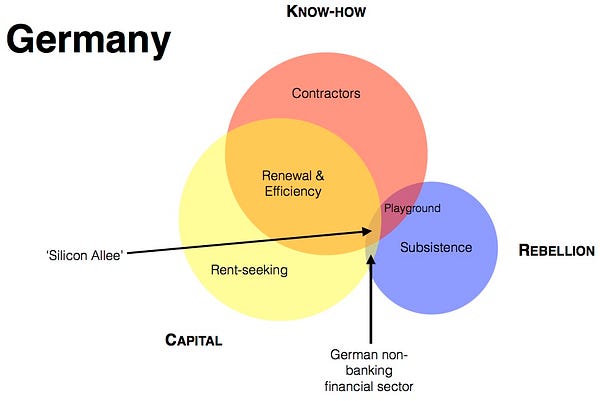
Germany
is the land of efficiency. There is a lot of know-how in Germany,
including that coming from neighboring Eastern European countries. But
venture capital is small, probably due to the activism of German banks
and their tradition of financing businesses. As a consequence, know-how
is mostly “trapped” in established companies and allocated to
efficiency innovation within big German corporations. Since they
practice continuous innovation, those corporate powers tend to be ahead
of their counterparts in other countries; but this does not amount to
entrepreneurial innovation (I’ll spare you the VW jokes). Having worked
in the German business world, I can tell you: there is no rebellion
there. The entrepreneurial economy is thus confined in the marginal Berlin culture, and since capital and know-how are retained by established companies, the German entrepreneurial economy is far from thriving.
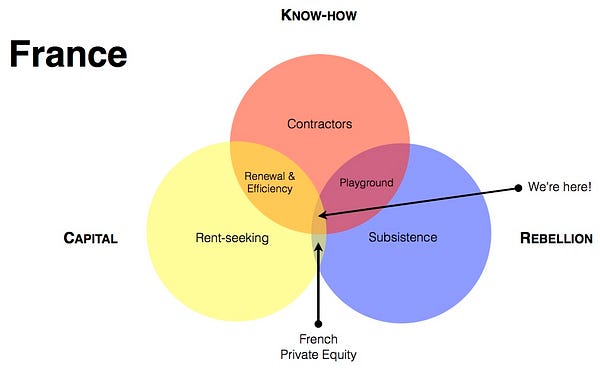
Let us conclude with the French
case—also an interesting one, if only because it inspired us to start
TheFamily. My partners and I often speak about the toxicity of the
French environment for Entrepreneurs. We have founded TheFamily to try
to battle this toxicity.
The
model detailed above allows us to better understand where the French
toxicity comes from. After all, France is an enigma: why do we have such
a hard time building great entrepreneurial ventures when we have so
much capital, know-how and rebellion? Every year, many people leave
traditional companies to start their own venture. Know-how is abundant:
our engineering schools are among the best in the world, as demonstrated
by American companies that locate their R&D operations in France. Finally, there appears to be capital to finance launching and growing tech startups: venture capital key metrics are up; and they say all promising companies manage to raise capital in Paris.
And
yet, it doesn’t work. Why? The short answer goes like this: in France,
no one mixes up the three ingredients. Capitalists, engineers and rebels
are there, but they don’t live in the same world and are often openly
defiant towards one another.

The longer version follows three main arguments.
There’s a lot of capital in France, but the rent-seeking economy is so powerful (real estate, taxi companies,
pharmacists, lawyers, doctors, craftsmen, farmers, solicitors and
clerks of all sorts) that capitalists see no reason why they should risk
anything by investing in startups. A lot of capital is also tied up in
heavy infrastructures (transportation, energy, telecommunications,
tourism), but that capital is also captured by special interests that
seek rent (in tourism) or confine their innovation efforts to renewal
and efficiency (telcos). The only rebels in French capitalism are those
in the private equity sector, who frighten many stakeholders with
aggressive leveraged buyouts. Even venture capitalists stay in line in
France, as their funds are mostly financed by the Government through Bpifrance.
There’s a lot of know-how in France,
but everything is done so that it is mostly allocated to efficiency or
contractor work. France has good engineers, but there are two problems.
1) As Gwendal Simon explains here,
French engineers are usually not interested in execution. They were the
best students throughout their time in school, so they see themselves
as corporate executives, not software developers. 2) Thanks to our
research tax credit, a matter of national pride, engineers' salaries are
subsidized by the government (yes: those engineers that every tech
company is willing to pay good money for are subsidized in France). As a
result, the engineering job market works like a cartel: every company,
whether in the efficiency, playground or contractor economy, can afford
to pay the same (relatively good) salary, whatever value they create. It
is thus difficult for entrepreneurial ventures with no capital to match
those salaries and to attract the best engineers.

Finally, there’s a lot of rebellion in France, as demonstrated by frequent strikes and shirts being torn off corporate executives.
But when that rebellion comes from Entrepreneurs trying to make their
way out of the playground, it attracts nothing but problems:
cease-and-desist orders, lawsuits, even nights in prison. It should be
said again and again: in every country, Entrepreneurs usually don’t fit
in the box. Only in some select countries, such as the U.S., rebellion
allies itself with know-how and capital to overcome obstacles and beat corporatism.
In France, on the other hand, rebellion is tolerated, even supported,
but not in entrepreneurial matters. As a result, it thrives in other
universes, such as activism or art creation. But Entrepreneurs are
confined to the playground.

My
own perception, after many years spent in that ecosystem, is that
France fails on the entrepreneurial front because entrepreneurship is
suppressed by both rent-seeking (which ties up available capital),
contracting (which captures know-how), and corporatism (which suppresses
rebellion). It is not a caricature, but the inconvenient truth: we’re a
mix of Tunisia (for tourism), London (for the real estate market), India (for IT services) and Greece (for the political system ready to explode).
Where
is our entrepreneurial economy? For sure, there are a lot of
Entrepreneurs in France, and they create hundreds of startups. A
worrying sign, however, is that none of the currently dominant tech
companies has grown out of France. This is why we’ve worked hard at
TheFamily on finding ways to connect know-how, rebellion and capital
enough to help promising ventures grow and scale.
France’s
entrepreneurial economy is already proud of BlaBlaCar, en route to a
dominant position on the global long-distance ride-sharing market: lots
of know-how, lots of capital (thanks to foreign investors), and a good
amount of rebellion.
But
there are other promising jewels in the crown, notably future global
players currently growing within TheFamily’s own ecosystem. Save, a company that rescues all your smartphones and tablets,
was founded less than two years ago: it will have 700 employees and a
€2M monthly revenue by the end of this year; in 2016, it will launch in
the U.S. and China, adding to the 7 countries in which it is already
operating. Algolia, another company in our portfolio, offers a Hosted Search API; it was also founded in 2013, raised $18M a few months ago
and will soon have crossed the threshold of 250 billion API calls from
customers all over the world. Out of 350 companies in our portfolio, we
believe that we now have more than 50 such promising stars.
This
is what we do as a long term, strategic, minority shareholder: operate
our own ecosystem, empower Entrepreneurs, defeat toxic environments, and
build new empires. So join up with us, and let’s get to work.
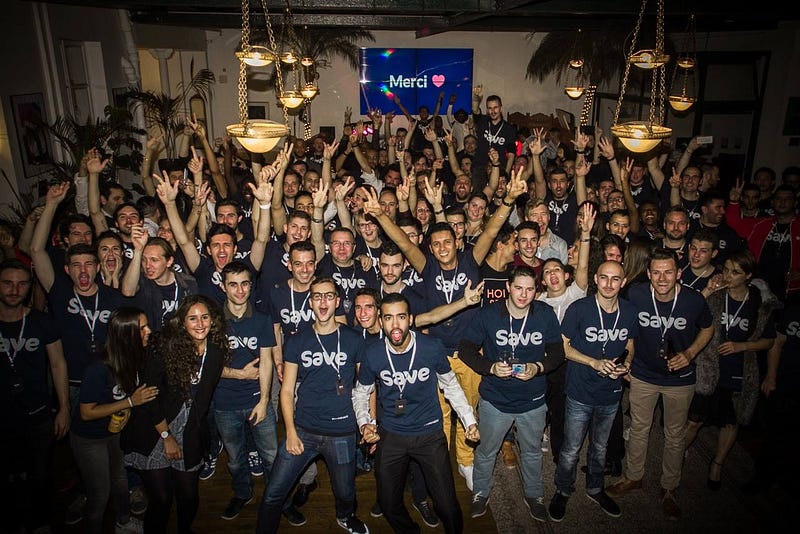
Here is a reading list I highly recommend for anyone willing to better understand entrepreneurial ecosystems:
- Marc Andreessen, “What It Will Take to Create the Next Great Silicon Valleys, Plural”
- Steve Blank, “The Secret History of Silicon Valley” (video + blog)
- Kim-Mai Cutler, “How Burrowing Owls Lead To Vomiting Anarchists (Or SF’s Housing Crisis Explained)”
- Paul Graham, “Can You Buy a Silicon Valley? Maybe”
- Paul Graham, “How To Be Silicon Valley?”
- Paul Graham, “Why Startups Condense in America”
- Jaron Lanier, “Early Computing’s Long, Strange Trip”
- Balaji Srinivasan, “Software is Reorganizing the World”
- Vivek Wadhwa, “Silicon Valley Can’t Be Copied”
A PBS program on Silicon Valley (you can watch it from the U.S. only).
For those willing to read more, a few excellent books by William Janeway, Josh Lerner, Enrico Moretti, Carlota Perez, AnnaLee Saxenian.
Source: https://medium.com/welcome-to-thefamily/what-makes-an-entrepreneurial-ecosystem-815f4e049804